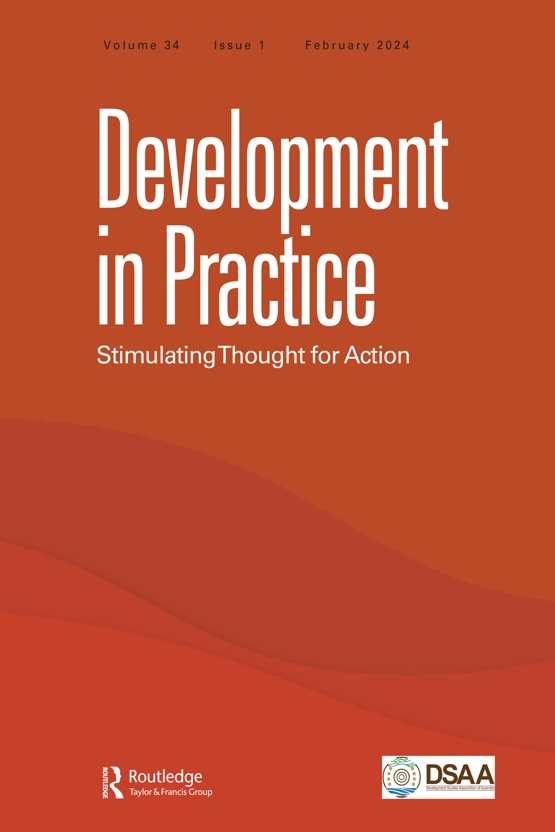Submit a Manuscript to the Journal
Development in Practice
For a Special Issue on
Interrogating Development: Identity, Power, and Resistance in the Global South
Abstract deadline
Manuscript deadline

Special Issue Editor(s)
Dr. Vikram Singh,
Indira Gandhi National Tribal University, Regional Campus Manipur, India
vikramrcmswigntu@gmail.com
Interrogating Development: Identity, Power, and Resistance in the Global South
Call for Submissions:
We are seeking original research articles, viewpoints, and practice notes that critically engage with the complex intersections of identity, power, and resistance within the field of development, particularly from the perspective of the Global South.
This special issue invites submissions that:
Focus on the voices and experiences of those at the peripheries of power. By including the perspectives of Dalit women, queer individuals, Indigenous communities, informal workers, and displaced ethnic groups, it opens up space to reimagine development not as a technocratic or one-size-fits-all model, but as a terrain of struggle, negotiation, and resistance. This reimagining encourages a more inclusive and just approach to development. Contributors engage with questions such as: Whose knowledge counts in development planning?
How do caste, gender, and racial formations shape access to resources and participation? What alternative imaginaries of development are being articulated by grassroots movements and subaltern communities? In doing so, this issue aims to move beyond tokenistic inclusion or identity-based add-ons to development discourse. Instead, it advances a grounded, critical inquiry into how identity, power, and resistance co-produce the lived realities of development in the Global South — and how your active participation can help forge more just and plural futures.
We particularly welcome interdisciplinary and praxis-oriented contributions from scholars, practitioners, and researchers, especially those based in or working with communities in the Global South.
Aims and Objectives of the Special Issue:
This Special Issue seeks to critically examine how intersecting structures of identity and power shape development as a global project. Focusing on the Global South, we must explore how race, caste, class, gender, ethnicity, sexuality, and geography interact with the logics of development to produce both marginalisation and resistance. The Issue invites contributions that engage with these questions through empirical, theoretical, and praxis-based approaches, particularly emphasising the crucial need for interdisciplinary and decolonial scholarship in the field of development studies. The specific objectives of the Special Issue are to:
- Interrogate how historical and contemporary power hierarchies—such as colonial legacies, caste systems, patriarchy, and racial ideologies—and resistance to them inform development discourse, policy, and practice.
- Analyse the role of key actors—states, international financial institutions, development agencies, NGOs, and social movements—in shaping both inclusive and exclusionary development trajectories.
- Critically assess sectoral disparities in health, education, housing, employment, and sanitation, particularly their impact on structurally marginalised populations.
- Explore how intersectional identities—across caste, race, gender, class, ethnicity, sexuality, disability, and indigeneity—mediate experiences of development and underdevelopment.
- Document and reflect upon grassroots, community-led, rights-based, and decolonial development practices that challenge dominant paradigms and offer alternative visions of justice and equity.
Suggested Sub-Themes:
This Special Issue invites contributions across various thematic areas, critically examining development through intersectional, decolonial, South–South, and justice-oriented frameworks. Suggested themes include, but are not limited to:
- Colonial Legacies and Development Discourse
- Historical continuities of and resistances to empire and postcolonial Southern-led statecraft in development.
- Decolonial and Southern critiques of global development institutions and agendas.
- South–South collaborations.
- Caste, Race, and Ethnicity in Development Practice
- Racialised, religious,and caste-based exclusions in social policy and welfare.
- Ethnic and Indigenous marginalisation in state-led and donor-driven interventions.
- Gender, Sexuality, and Development
- Feminist and queer critiques of development paradigms.
- Gender mainstreaming and its limitations and opportunities in Global South contexts.
- Intersectionality, Identity, and Structural Violence
- Intersections of caste, class, gender, religion, disability, and geography.
- How intersectional identities shape experiences of exclusion and resistance.
- Grassroots and Community-Led Development
- Practices of resistance and autonomy by local and Indigenous communities.
- Rights-based, participatory, and solidarity-driven alternatives.
- Development and the Politics of Knowledge
- Whose knowledge counts in development planning and implementation?
- Epistemic injustice, knowledge hierarchies, and local knowledges.
- Critical Reflections on SDGs and Neoliberal Development
- Evaluation of Sustainable Development Goals (SDGs) through equity and justice lenses.
- Neoliberalism, privatisation, and the commodification of welfare services.
- State, Civil Society, and the Role of NGOs
- Politics of inclusion and exclusion in state-NGO partnerships.
- Donor influence, advocacy, and accountability in development programming.
- Southern institutions and donors in development and how they challenge or enable global development institutions and agendas.
- Development, Displacement, and Environmental Injustice
- Development-induced displacement and ecological violence.
- Climate justice and Indigenous environmental struggles.
- Urban Marginality and Informal Economies
- Urban poverty, slum development, and informal labour dynamics.
- Smart cities, gentrification, and the erasure of marginalised populations
Submission Instructions
- Types of Papers Accepted:
- Full-length research articles (max. 6000 words)
- Viewpoints or practice notes (max. 3000 words)
- Abstracts should be sent directly to the guest editor, who will select relevant abstracts and respond to the authors by 15 September 2025. Full manuscripts are due by 15 December 2025 and should be submitted directly to the journal's submission portal. Authors should provide a cover page giving brief biographical details (up to 100 words), institutional affiliation(s) and complete contact information, including an email address.
- Follow the journal’s Instructions to Authors. https://www.tandfonline.com/action/authorSubmission?show=instructions&journalCode=cdip20
- Full manuscripts have to be submitted via ScholarOne, selecting “Interrogating Development: Identity, Power, and Resistance in the Global South” from the Special Issue dropdown menu.
- Early submissions are encouraged. Authors needing developmental feedback may also register for online writing workshops and mentorship support led by the Guest Editor.

